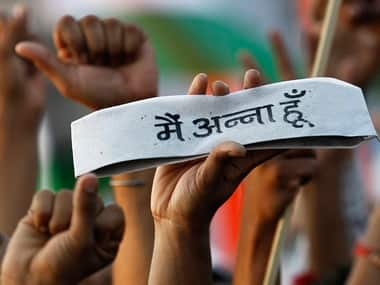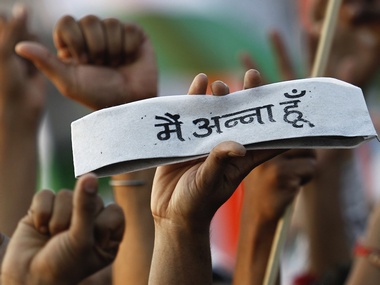Before the din over the Food Security Bill overwhelms us once again and makes us deaf to everything else in the world, here is something to ponder. What happened to the Lokpal bill? Where is the Whistleblower’s Protection Bill? Did you hear of the Grievance Redressal Bill recently? In case you are wondering what the heck these bills are, here’s something to refresh your memory. Two years ago, a hugely popular anti-corruption movement led by social activist Anna Hazare had brought the political class on its knees and nearly caused the collapse of the government. The leaders of the movement, mostly prominent civil society members, were demanding the institution of Lokpal, the anti-corruption ombudsman, to check corruption in the country, particularly in high places. It caught the imagination of the country and thousands of citizens, mostly youth, poured onto the streets to extend support to Anna. [caption id=“attachment_1048955” align=“alignleft” width=“380”]
 What happened to the civil society organisations? Was it all a sham? Reuters[/caption] Arvind Kejriwal, the most vocal among the movement’s leaders, had turned an instant celebrity and the darling of the media and the middle class. The bill, if passed, would not have wiped out corruption in India, but would certainly have instilled the fear of God in the corrupt. The agitation forced the government to frame the Lokpal bill. It was passed by Lok Sabha but got stuck in Rajya Sabha. We don’t hear of it much now. Last heard, it is with a parliamentary select committee. The Whistleblower’s Bill, another anti-corruption measure, was framed to extend protection to whistleblowers inside organisations. Aimed at ensuring transparency and accountability in governance, the bill, if made into an Act, has the potential to break the shield of opacity and secretiveness behind which the Indian bureaucracy operates. Passed in Lok Sabha, the bill is awaiting clearance in the Upper House. Last heard, the government has incorporated several changes to the bill surreptitiously, rendering it ineffective. The Grievance Redressal Bill - the Right of Citizens for Time Bound Delivery of Goods and Services and Redressal of their Grievances Bill, 2011 in full - is designed to make the government machinery more responsive to the people’s needs by making service delivery a right. Under this, every public authority is bound to publish a Citizen’s Charter detailing the time required for each service it offers to the public. In case of lapse, the citizens have the right to make complaints and seek compensation. Once enacted, this Act has the potential to change the apathetic and arrogant ways of the bureaucrats. Last heard, it could be part of the Lokpal bill. All this, of course, is forgotten now. Corruption is no more a national issue. It no more sparks outrage on the streets. Lokpal was good fun till it lasted and who gives a damn about whistleblowers and people’s grievances. We are back to our favourite pastime, politician bashing, and politicians are back to their usual shenanigans, latching on to the latest news headline and making a song and dance over it. How short the public memory in India can be! And what was that so-called middle class anger and the youth’s frustration with corruption two years ago? Where is the media outrage gone? And what happened to the civil society organisations? Was it all a sham? It now appears everything was nice entertainment for all, and we all are suckers for good entertainment. We are never short of it as television channels and newspapers bring new entertainment into our lives every passing hours. In the end, the politicians have won the battle. They have taken advantage of our frivolousness.
What happened to the civil society organisations? Was it all a sham? Reuters[/caption] Arvind Kejriwal, the most vocal among the movement’s leaders, had turned an instant celebrity and the darling of the media and the middle class. The bill, if passed, would not have wiped out corruption in India, but would certainly have instilled the fear of God in the corrupt. The agitation forced the government to frame the Lokpal bill. It was passed by Lok Sabha but got stuck in Rajya Sabha. We don’t hear of it much now. Last heard, it is with a parliamentary select committee. The Whistleblower’s Bill, another anti-corruption measure, was framed to extend protection to whistleblowers inside organisations. Aimed at ensuring transparency and accountability in governance, the bill, if made into an Act, has the potential to break the shield of opacity and secretiveness behind which the Indian bureaucracy operates. Passed in Lok Sabha, the bill is awaiting clearance in the Upper House. Last heard, the government has incorporated several changes to the bill surreptitiously, rendering it ineffective. The Grievance Redressal Bill - the Right of Citizens for Time Bound Delivery of Goods and Services and Redressal of their Grievances Bill, 2011 in full - is designed to make the government machinery more responsive to the people’s needs by making service delivery a right. Under this, every public authority is bound to publish a Citizen’s Charter detailing the time required for each service it offers to the public. In case of lapse, the citizens have the right to make complaints and seek compensation. Once enacted, this Act has the potential to change the apathetic and arrogant ways of the bureaucrats. Last heard, it could be part of the Lokpal bill. All this, of course, is forgotten now. Corruption is no more a national issue. It no more sparks outrage on the streets. Lokpal was good fun till it lasted and who gives a damn about whistleblowers and people’s grievances. We are back to our favourite pastime, politician bashing, and politicians are back to their usual shenanigans, latching on to the latest news headline and making a song and dance over it. How short the public memory in India can be! And what was that so-called middle class anger and the youth’s frustration with corruption two years ago? Where is the media outrage gone? And what happened to the civil society organisations? Was it all a sham? It now appears everything was nice entertainment for all, and we all are suckers for good entertainment. We are never short of it as television channels and newspapers bring new entertainment into our lives every passing hours. In the end, the politicians have won the battle. They have taken advantage of our frivolousness.
Dear Sonia, forget food bill: What happened to Lokpal?
Akshaya Mishra
• August 21, 2013, 12:56:10 IST
Lokpal was good fun till it lasted and who gives a damn about whistleblowers and people’s grievances.
Advertisement
)
End of Article